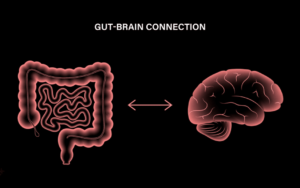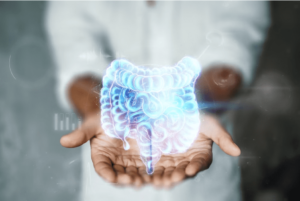The Nutraceuticals: A Path to Lowering Cholesterol Naturally
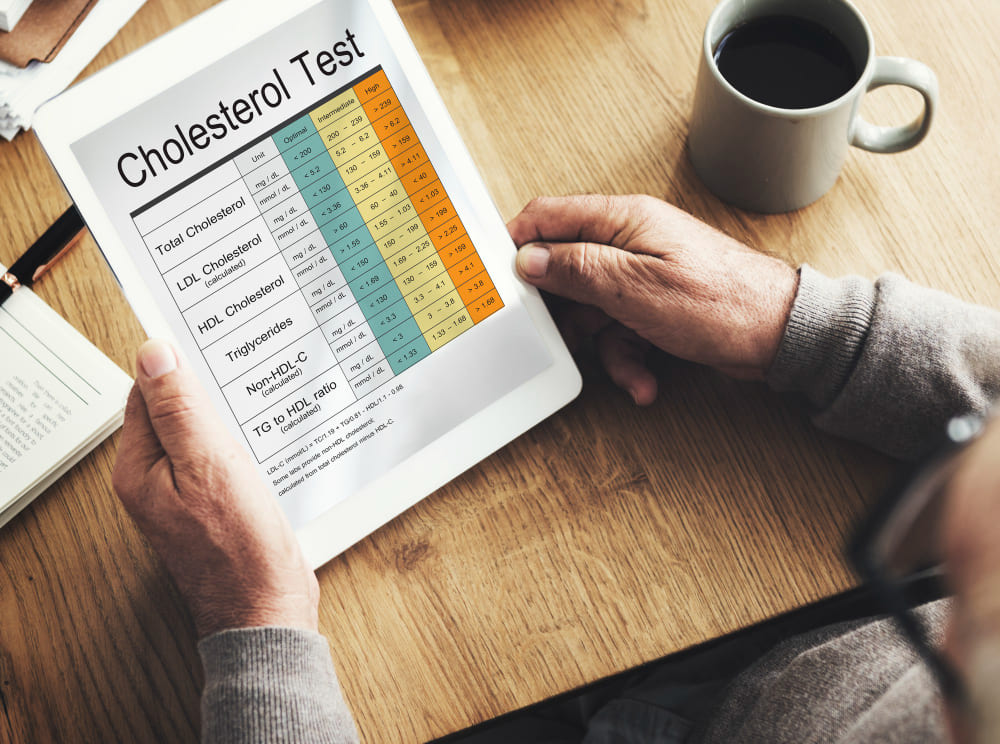
Did you know that a life is lost to cardiovascular diseases in the United States every 36 seconds? It’s a concerning fact, and the main culprit behind this is high cholesterol levels in the blood, also known as hypercholesterolemia. The good news is that hypercholesterolemia is manageable, and you can take steps to improve your cholesterol levels:
However, for individuals at high risk or with borderline cholesterol levels, lifestyle changes alone may not be enough. This is where nutraceuticals come into play. Scientific research supports the use of dietary supplements in reducing the risk of heart disease. Nutraceuticals aid in improving lipid metabolism and lowering cholesterol levels in the body.
Why is it Essential to Treat Hypercholesterolemia?
Entering your forties brings health concerns to the forefront. It’s no surprise if you find your cholesterol levels slightly disturbed, given our fast-paced lives that make it challenging to maintain healthy diets and exercise routines. However, what might be alarming is the term “dyslipidemia,” which refers to:
Cholesterol exists in two forms:
Triglycerides are fats found in the blood, and levels exceeding 500mg/dl pose health risks, particularly for people with diabetes who often lack sufficient HDL and have high LDL and triglyceride levels.
Lifestyle changes are crucial, and dietary supplements play a significant role. Research indicates that reducing LDL levels by 1.0mmol/L can decrease the risk of cardiovascular disease by an impressive 22%. However, it’s important to note that cardiovascular disease is complex and influenced by multiple factors. Even individuals with average cholesterol levels may face increased risks due to other factors, underscoring the importance of controlling cholesterol levels. While cholesterol-lowering drugs (statins) exist, their side effects often deter patients from following prescribed treatments. This intolerance makes doctors hesitant to use statins for borderline cases, where nutraceuticals can be beneficial when combined with lifestyle interventions.
What is the Role of Dietary Supplements in Managing Hypercholesterolemia?
As mentioned earlier, lifestyle interventions are crucial for regulating cholesterol levels, with dietary management playing a primary role by:
Nutraceuticals are ingredients known for their health benefits in disease prevention and treatment.
Dietary supplements are products that contain higher amounts of nutraceuticals, complementing the regular diet with additional nutrients. These supplements are typically regulated and approved by the FDA. Numerous dietary supplements have shown efficacy in improving cholesterol metabolism.
There are two ways to incorporate nutritional supplements into our diet.
In cases where natural nutrient-rich foods have failed to produce desired effects, research indicates that incorporating nutraceuticals or dietary supplements can be beneficial in reducing disease risk for individuals with dyslipidemia or high cholesterol levels. Now, let’s explore the specific nutraceuticals that provide these effects.
1. Soy Derivatives
Soy derivatives have been suggested to have a potential cholesterol-lowering effect, although the evidence is limited. The American Heart Association conducted a review of randomized trials in 2006, specifically focusing on dietary supplements containing isolated soy protein with isoflavones. The findings indicated that these supplements could decrease LDL levels by approximately 3%.
Soy-based foods offer several benefits for heart health. They typically contain less saturated fat compared to regular meat, are naturally cholesterol-free, and serve as a good source of:
Some soy derivatives found in these foods include:
A meta-analysis demonstrated encouraging results, showing that an average daily consumption of 47 grams of soy resulted in:
Replacing animal-based foods with soy-based alternatives has shown promise in lowering cholesterol levels, as supported by the Japan Public Health Center-Based study. The study compared two groups of women:
The results indicated:
Examples of soy-based foods include:
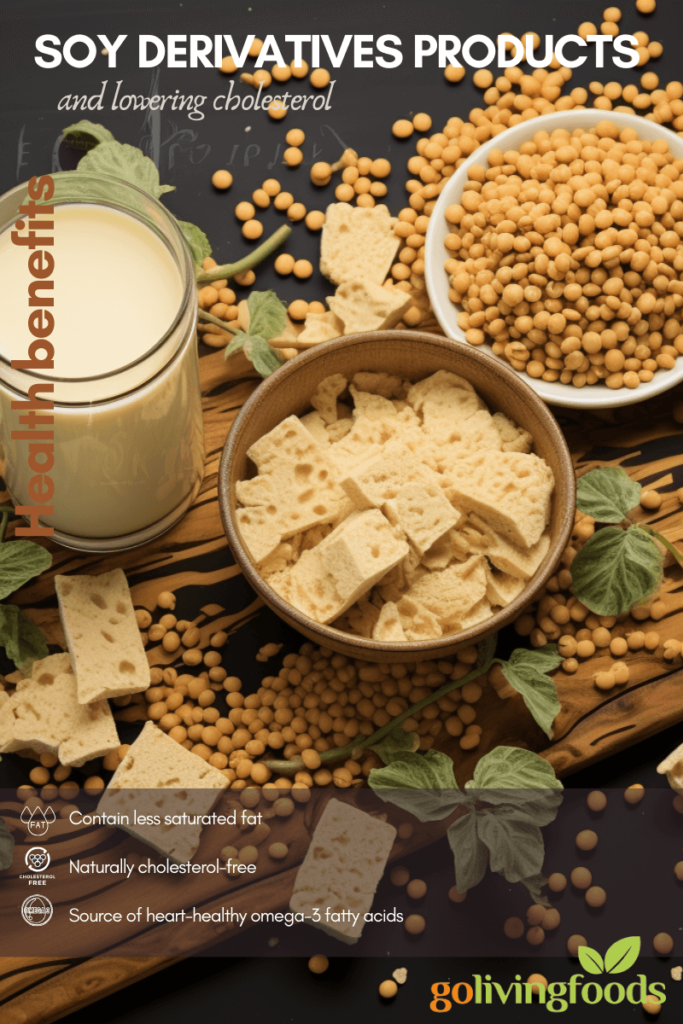
2. Dietary Fibers
Dietary fiber can be categorized into two types:
Soluble fiber absorbs water and forms a gel-like substance, while insoluble fiber passes through the digestive system without significant changes.
It is the soluble fiber that plays a role in lowering blood cholesterol levels, as supported by studies. Consuming 10 to 25 grams of soluble fiber per day can reduce LDL levels by 18%, without affecting HDL or triglyceride levels.
How does soluble fiber achieve this? It binds to cholesterol particles in the small intestine, preventing them from entering the bloodstream.
Another study focused on a group of high-risk individuals, including those with type 2 diabetes or three cardiovascular risk factors. The results of increased dietary fiber intake were remarkable, showing a noticeable reductions in:
Fiber-rich foods include fruits, vegetables, whole grains, and legumes. Additionally, there are supplements available that contain concentrated soluble fibers derived from algae, such as Nori or Kombu.
3. Plant Sterols
Certainly! Phytosterols, also known as plant sterols, are bioactive compounds that are structurally similar to cholesterol. They are naturally present in various plant-based foods, including fruits, vegetables, nuts, seeds, and whole grains.
Phytosterols have gained significant attention due to their potential cholesterol-lowering effects. When consumed as part of a balanced diet, phytosterols can help reduce the absorption of cholesterol in the intestines. They compete with cholesterol for absorption, effectively blocking its uptake into the bloodstream. As a result, the overall cholesterol absorption is reduced, leading to lower levels of total cholesterol in the body.
Moreover, phytosterols have been found to influence cholesterol metabolism and synthesis. They regulate the activity of transport proteins involved in cholesterol transportation and play a role in inhibiting cholesterol production in the liver. By modulating these processes, phytosterols help maintain cholesterol balance in the body.
4. Red Yeast Rice
Red yeast rice (RYR) is a commonly used ingredient in Asian cuisine and is produced by fermenting yeast on white rice. It is also available in the form of oral supplements and is known for its cholesterol-lowering benefits. Red yeast rice contains several monacolins, with monacolin K being particularly noteworthy. Monacolin K is the same active ingredient found in statin drugs prescribed for lowering cholesterol levels, and it may play a role in reducing blood cholesterol.
A study called “The China Coronary Secondary Prevention Trial” examined the potential effects of red yeast rice (11). The study involved 4,870 patients who had a history of acute myocardial infarction (heart attack) with high cholesterol levels. Half of the patients were given Xuezhikang, a partially purified extract of red yeast rice, while the other half received a placebo. The study lasted for 4.5 years, and the results showed that the group treated with the red yeast rice supplement experienced the following benefits:
These findings suggest that red yeast rice supplementation may have a positive impact on cardiovascular health and contribute to improved outcomes for individuals with a history of heart attack and high cholesterol levels. However, it’s important to note that the use of red yeast rice should be done under medical supervision, as it contains active compounds that can interact with other medications and may have potential side effects.
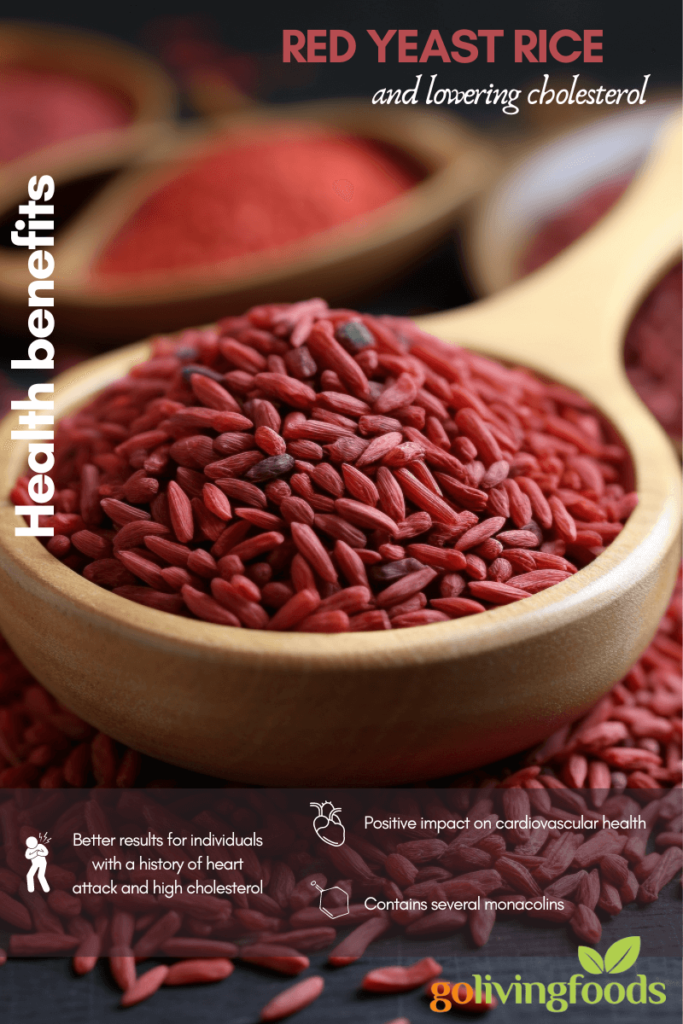
5. Berberine
Berberine is a chemical compound derived from various plants and herbs, and it is available as a dietary supplement with potential benefits for individuals with high cholesterol levels. This nutraceutical has long been used in traditional Indian and Chinese therapeutic remedies. Research has explored the effects of berberine on various health conditions, including inflammation, cancer, and Arthritis.
Berberine has shown several positive effects on human health. It has been found to help manage blood sugar levels, contribute to weight management, and lower overall body lipid levels. This plant extract works in several ways:
A meta-analysis of 11 randomized controlled trials (12) involving 874 patients with high cholesterol, type 2 diabetes, or both, investigated the effects of berberine supplementation. The daily dose of berberine ranged from 0.5 grams to 1.5 grams. The results compared the treated group with the control group and showed the following outcomes:
These findings suggest that berberine supplementation may be beneficial in managing hypercholesterolemia, particularly for individuals with high cholesterol and type 2 diabetes.
Takeaway
Cardiovascular diseases are complex and influenced by multiple factors. While there is no single solution, combining lifestyle interventions with dietary supplements has shown promising results, particularly in low-risk patients. Nutraceuticals, which are natural plant-based elements, offer the advantage of having fewer side effects compared to pharmaceutical drugs. To ensure safety and efficacy, health experts recommend obtaining dietary supplements from reputable sources.

